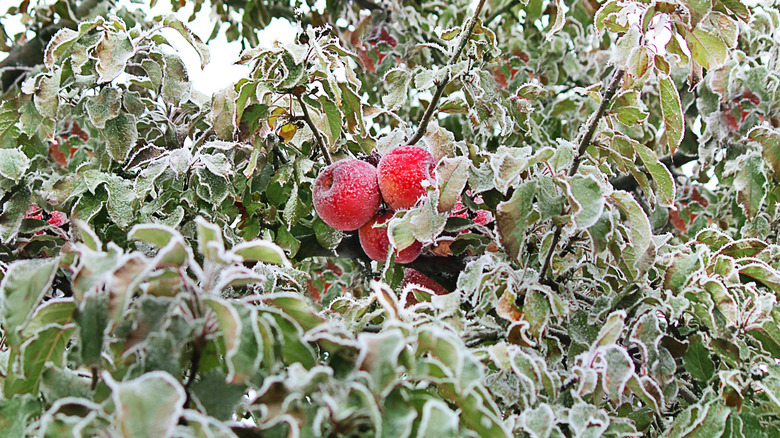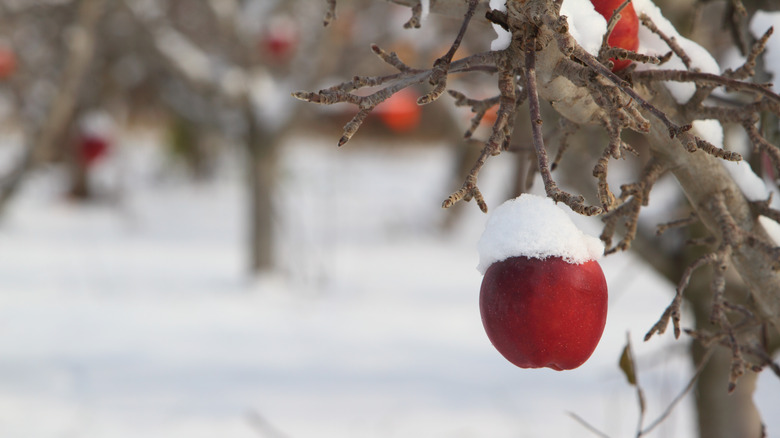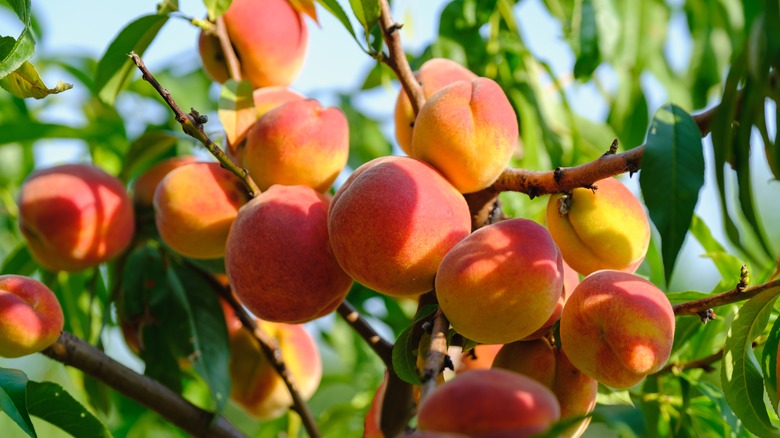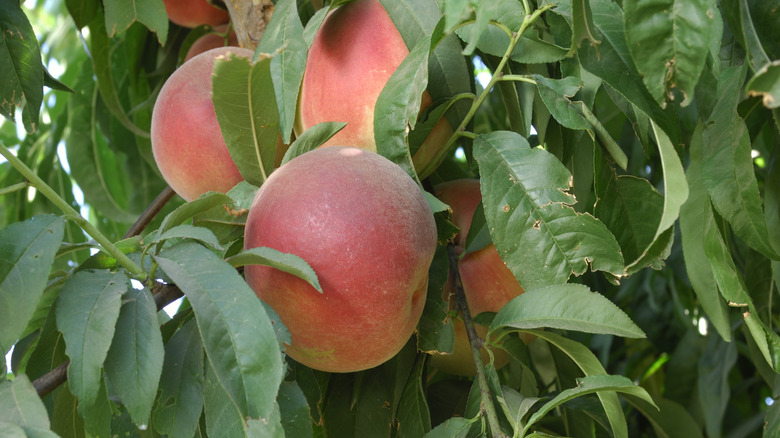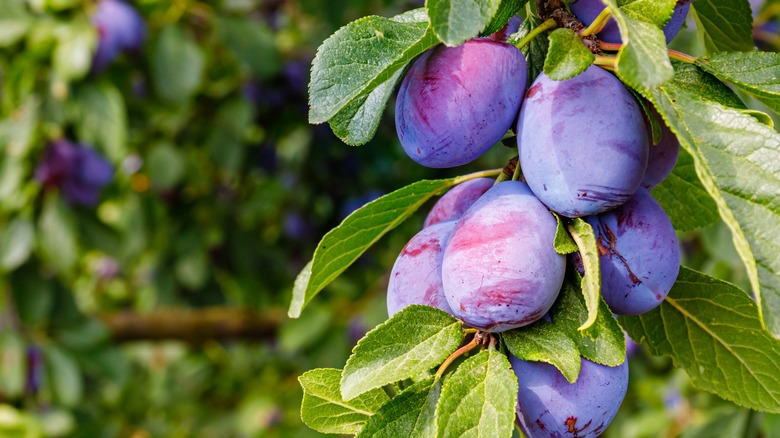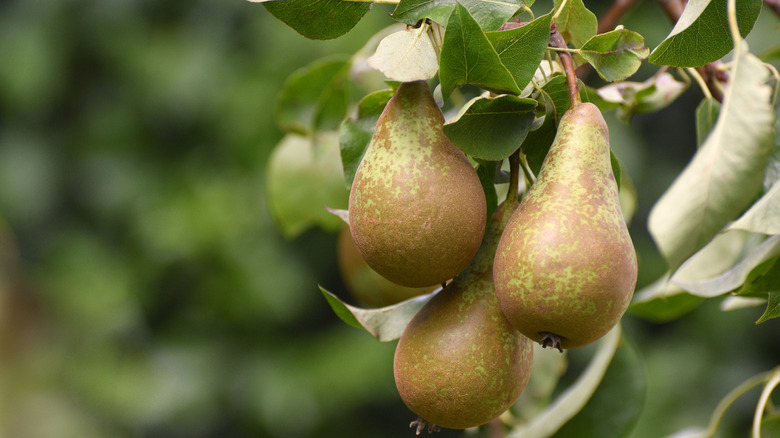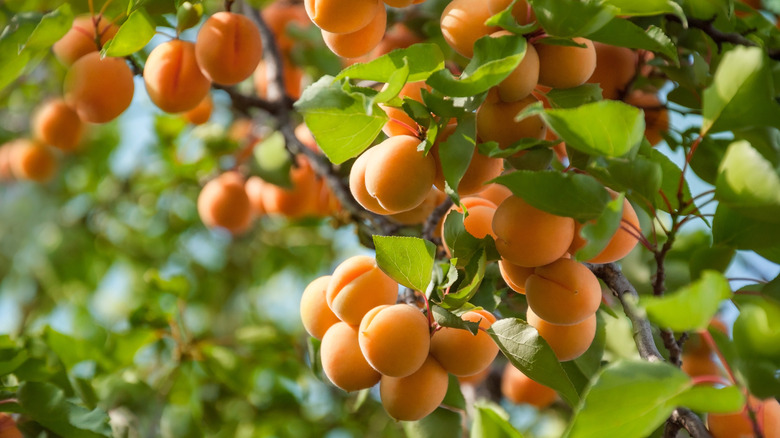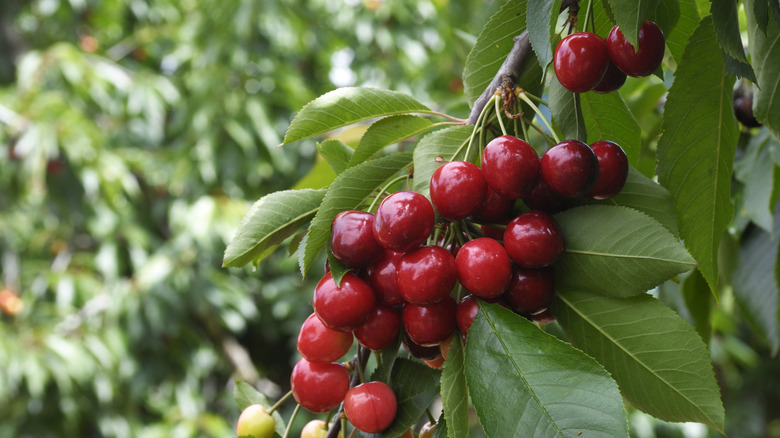Fruit Trees You Didn't Know You Could Grow In Colder Climates, According To Our Professional Gardener
Growing fruit trees is a satisfying endeavor for the home gardener. Not only are they beautiful additions to the landscape with their fragrant blossoms and graceful branches, but they also provide delicious produce and are excellent for attracting beneficial pollinators. Selecting your fruit trees before planting means doing a bit of research to make sure the size and shape of the specific type is right for your space. It's also important to plant a fruit tree in your backyard that is suited to your USDA hardiness zone, especially if you live in a cold region.
While it was once difficult to find summer-bearing fruit trees like delectable peaches and nectarines that grew well in areas with cold temperatures during winter, there are now many hybrids and new cultivars available that are much more hardy. Other types such as apples and pears come in a range of varieties. While their cold hardiness varies, there are plenty available for northern locations. If you live in a place with frigid winters, this guide can help you select the best hardy types for your area.
Many fruit trees need to cross-pollinate with similar trees that blossom at a different time to help them bear fruit. This can be a bit complicated, as the different blossoming times may correspond to different zones. Be sure to choose a pollinator tree that is still cold hardy enough for your region, or get self-pollinating trees if available.
Apple trees
Most commercially-available apple trees are grafted onto crabapple tree stock, which are winter hardy to USDA zone 4. Some apples grow best in zone 6 or higher, so choose one suitable for your area. If you live in zone 4, there are many delicious varieties you can grow including Baldwin, Jonagold, Empire, Macintosh, Macoun, Northern Spy, Winecrisp, and Zestar. Some apple trees are even hardy to zone 3 and include Honeycrisp, Duchess of Oldenburg, Harcourt, Gravenstein, Wolf River, and Fireside. Many of these are available for purchase from StarkBros Nursery.
Peach trees
Peaches are nutritious and delicious, and if freshly-picked and eaten when ripe in summer, they taste outstanding. Peaches are often associated with southern states, but there are actually many varieties that grow fine in colder areas. Peach trees may bear fruit anytime between July and September, depending on the variety. There's a large number of peach cultivars that are cold hardy to zone 5. These include Elberta, Galaxy, Belle of Georgia, Contender, Crest Haven, Intrepid, Garnet Beauty, Redhaven, Reliance, Sentry, Desertgold, Hale Haven, and Suncrest.
Nectarine trees
Nectarines are one of the most delightful pleasures of summer and can do everything peaches can do — they can be eaten fresh, baked into pies, or made into bellinis. They're very similar to peaches in taste, texture, and appearance, but some people prefer them because of their smooth skins that don't have any peach "fuzz." Nectarines tend to be grown in USDA zone 6 or higher, but there are some nectarine tree cultivars that are suitable for growing in zone 5. These cold hardy nectarines include Independence, Fantasia, Hardired, Flavortop, Mericrest, Royal Giant, and Avalon.
Plum trees
Plums are long-lived trees that produce small but flavorful fruits. Dried plums are also known as prunes. There are many different types of plums, often categorized by their colors (black, yellow, and red). Some American plum and Japanese-American hybrid cultivars are cold hardy to USDA zone 3 including Pipestone, Tecumseh, Alderman, Brookgold, Toka, Black Ice, Waneta, and Underwood. Other types of plums are hardy to zone 4, like Superior and Mount Royal. The Tree Farm in Colorado sells a number of these cold hardy plum trees for home growers.
Pear trees
Sweet and fragrant, pears are a delicious fruit that appears in late summer through early autumn. If they're picked a bit green, pears can be ripened in a brown paper bag. Early Gold and Golden Spice are pear trees that are hardy to USDA zone 3. Zone 4 hardy pears include Luscious, Patten, Gourmet, and Summercrisp. Based in upstate New York, St. Lawrence Nurseries has an excellent selection of cold hardy pear trees for the home grower, including Golden Spice, Patten, and Summercrisp, as well as Ely, Chazy River, Jubilee, and many others.
Apricot trees
Apricots have a unique, sweet flavor and are wonderful when eaten fresh or used in baking or cooking. They have a short harvest season, but apricot trees can be grown in cold regions. Although apricot trees can be tricky to grow, most of them are self-pollinating. Some growers recommend planting a Nanking cherry tree as a cross pollinator to improve harvest amounts. The Casino and Westcot cultivars are both hardy to USDA zone 3. Varieties hardy to zone 4 include Goldcot, Puget Gold, Canadian White Blenheim, Tilton, and Tomcot.
Cherry trees
Although their blossoms are not as showy as those seen on ornamental cherry blossom trees, cherry trees produce tasty stone fruits in summer that are wonderful for snacking, baking, and preserves. Cherries come in sour or sweet varieties, and sour ones tend to ripen earlier than sweet types. They also come in a wide range of colors from yellow streaked with pink to deep red. The cherry tree cultivars hardy to USDA zone 5 include Sweetheart, Black Pearl, Bing, Lapins, Rainier, Montmorency, and Royal Ann. Online Orchards sells all of these cold-hardy cherry tree varieties.

